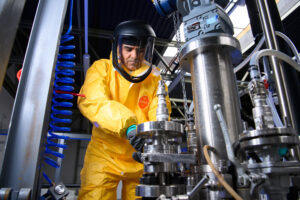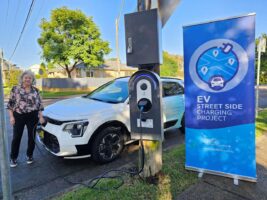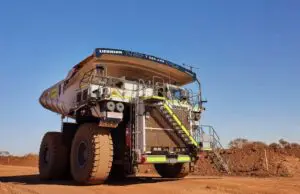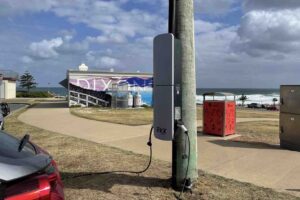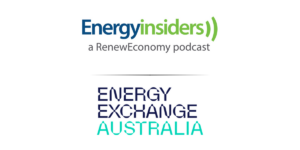This week has been a big one for batteries and electric vehicles (EVs), both of which have been making headlines.
Firstly, Germany is getting Europe’s biggest battery, a 50-megawatt lithium-ion unit produced by Mitsubishi Corp. and Eneco NV, to help balance the electrical grid and eventually help store power from local wind farms.
Work will start in the third quarter on the Jardelund project near Germany’s border with Denmark, according to separate e-mails from Dutch utility Eneco and Schleswig-Holstein, the German state where the battery will be installed.
The project will cost less than 100 million euros ($US107 million), Eneco spokesman Arie Spruit said. The state will tap a European Union regional-aid fund to contribute as much as 2 million euros.
The battery is designed to improve grid stability in the Jardelund region, which relies on intermittent wind power for much of its electricity. Pending field trials, the unit could turn a profit by storing excess power during periods of strong winds, Spruit said.
Wind and solar generated about 84 per cent of Schleswig- Holstein’s power last year with the remainder made up by conventional power, according to the state. As a battery unit for local wind farms, Jardelund may be able to store enough power for about 5,300 homes.
Meanwhile, Volkswagen AG gave details of its plans to spend $US500 million supporting EVs. VW wants to target its initial round of legally required zero-emission vehicle infrastructure investments toward chargers on highways across the U.S. and projects in 16 metropolitan areas, according to a company official.
A $14.7 billion settlement over Volkswagen’s diesel emissions scandal requires the automaker to invest $US2 billion over 10 years to support the development of zero-emission vehicle infrastructure.
Environmental Protection Agency and California regulators are reviewing a pair of investment plans that detail how Volkswagen intends to spend the first $500 million of that money, according to Wayne Killen, senior director of charging infrastructure planning and operations at Electrify America.
Electrify America is a VW subsidiary established to oversee implementation of the company’s zero-emission vehicle, or ZEV, investment plan under the settlement.
Under the plans, Electrify America would make $200 million in investment in California and $300 million in the rest of the U.S. Those plans call for the installation of about 1,100 different vehicle charging sites in the first 30 months, Killen said.
Mercedes, for its part, is looking to lead the way as robo-taxis take to the road. Daimler AG and the world’s biggest auto-parts maker plan to offer driverless taxis in the U.S. and Germany within six years, as competition to become the first provider of autonomous shared cars intensifies.
Daimler’s Mercedes-Benz division and automotive technology giant Robert Bosch GmbH have teamed up to run the vehicles in at least four locations, including Silicon Valley and their hometown of Stuttgart, according to a statement.
Competing with newer entrants such as Uber Technologies Inc. and traditional rival BMW AG, the project will allow customers to order automated cars via smartphone.
“The idea behind it is that the vehicle should come to the driver rather than the other way round,” Daimler, parent of the world’s biggest luxury-car maker and Bosch said in the statement. The venture will have a workforce of a few hundred people.
Across in India, wind-turbine installations are primed for a third consecutive record year, according to turbine maker Suzlon Energy Ltd.
New installations will hit 6 gigawatts in the fiscal year ending in March 2018, Suzlon founder Tulsi Tanti said. The country added 5.4 gigawatts capacity in fiscal 2017 and 3.4 gigawatts the year before.
India has set a goal to more than double installed capacity to 60 gigawatts over the next five years as part of Prime Minister Narendra Modi’s climate pledge to install 175 gigawatts of renewable capacity by 2022. The Indian government has been shifting toward auctions to buy electricity from wind, phasing out feed-in tariffs that guarantee a fixed price to producers for their power.
Separately, the government is working to reduce emissions from sectors including cement manufacturing. Cement makers in India must now submit their plans to meet new emissions standards that took effect April 1 after the environment ministry turned down requests to extend the deadline for compliance.
The new norms set tighter emissions limits for sulfur dioxide, nitrogen oxides and particulate matter, which are lower than the limits that the industry had suggested, yet significantly more lenient than the strictest standards globally, such as the European Union’s.
Auctions continue to draw investors around the world. The latest announcement was from Saudi Arabia, which will begin seeking bids from renewable-energy companies to build wind and solar plants with a combined capacity of 700 megawatts as part of the kingdom’s $50 billion program to boost power generation and cut its oil consumption.
Energy Minister Khalid Al Falih will announce a request for proposals for the projects, the next phase in the country’s bidding process, at a conference this week in Riyadh, the ministry said. The ministry qualified 27 companies to bid for a 300-megawatt solar plant and 24 firms for a 400-megawatt wind farm.
The project is part of a plan to transform the Saudi economy by weaning it off oil and creating new industries. Other Middle Eastern countries including the United Arab Emirates, Jordan and Morocco are also developing renewable energy to curb fuel imports or conserve crude oil for export. Saudi Arabia plans to develop almost 10 gigawatts of renewables by 2023, requiring investment of $30 billion to $50 billion, Al-Falih said in January.
First Solar Inc. of the U.S. and the renewable energy units of Italy’s Enel SpA, France’s Total SA and Electricite de France SA, and Spain’s Acciona SA and Iberdrola SA are among the qualified companies.
Potential bidders from the Middle East include Abu Dhabi’s Masdar, Saudi Arabia’s ACWA Power International and Fotowatio Renewable Ventures BV, a Spanish unit of the Abdul Lateef Jameel Group, a Saudi conglomerate. Asian companies that qualified include JinkoSolar Holding Co. of China, Korea Electric Power Corp. and Japan’s JGC Corp. and Marubeni Corp.
Source: BNEF. Reproduced with permission.



